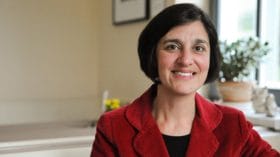
Beatriz Sarkis
This is how Beatriz Sarkis described the 3rd
World Assembly of the Global Christian Forum that was held on April 24 – 27 with more 250 Christians from different Churches, organizations and Christian Movements around the world. The Brazilian theologian received her degree in England and, with a Master’s Degree from a Lutheran University in Brazil through the help of the Focolare Movement, represented Focolare president Maria Voce at the conference. In one interview, Sarkis, the only laywoman at the Pontifical Council for the Promotion of Christian Unity from 2009 to 2016, explained the goal of the GCF. “The idea of creating a Forum began in 1998 as a result of a deep sharing among the Evangelical World Alliance, the Ecumenical Council of Churches, the World Pentecostal Fraternity and the Pontifical Council for the Unity of Christians. These four institutions worked together to support it and make it available to all.

Photo credit © Albin Hillert/WCC
, another was held in Indonesia (2011). Coming from 55 countries, there were Anglicans from Bogota, Adventists, Baptists, Catholics, Quakers, Disciples of Christ, members of the Salvation Army, Evanglicals, Independants, Lutherans, Mennonites, Methoidsts, Neo-Charismatics, Orthodox, Oriental Orthodox, Pentecostals, Reformed/Presbyterians, members of the Holiness movement, the African Instituted Waldensian Churches, Old Catholics and a representative group of Messianic Jews.”
The Global Christian Forum has the objective of putting in dialogue those Christians and Churches that have very different traditions. “The Forum doesn’t take the place of the valuable work of theologians, in the different commissions,” Sarkis explained, “but it is a path that we follow today inorder to gather the People of God and set them on their way, right away, on the path towards unity. If brotherly love is alive, the theological questions will be confronted more easily.

Photo credit © Albin Hillert/WCC
During the Assembly there were moments of sharing and common reflection on the future and the challenges that all Christians face today. There were moments for common prayer, at the beginning and end of each day. I personally took part in the Catholic Mass in the nearby Monastery of the Visitation.The theme chosen for the gathering was “Keep on loving one another as brothers and sisters” (Heb 13:1), which brought us right to the heart of the Christian faith. Divided into small groups, we offered our personal encounter with Jesus as a mutual gift to one another. This practice that was the main feature of the Forum right from the start, found particular resonance with the Focolare, because the communion of personal experiences is also al regular practice of the Movement. The sharing was deep and opened our eyes to discover the work that God carries out in the life of every one of us, causing prejudices to crumble. We rediscovered each other simply as Christians. Beyond this, I had the great joy of being able to share this experience, albeit briefly, with the local Focolare community that hosted me when certain circumstances prevented me from returning to Italy right away. The final message of the Assembly contains an invitation to unite in mutual love in Christ, to continue the journey together, since the divisions between Christians contradict the will of Jesus, scandalize the world and damage the common mission to proclaim the Gospel to all people. We must, all of us together, continue to build or strengthen this network. This is also the goal of the Centro Uno for the Unity of Christians, founded by Chiara Lubich in 1961 to take part, with the spirituality of unity, in working towards the full visible communion among the Churches.”




0 Comments